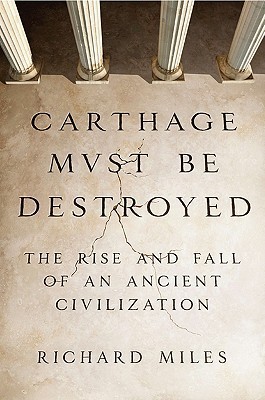Miles, Richard. Carthage Must Be Destroyed: The Rise and Fall of an Ancient Civilization. New York: Penguin, 2010.
Year ago, as I read Mary Beard’s phenomenal SPQR, I realized that I’d never really read a good history of the Punic Wars. I knew their basic outline, and of course the highlights of Hannibal Barca’s illustrious and ultimately ill-fated military career, but nothing really beyond that. I resolved to stay on the lookout for one, and my curiosity only deepened as I resolved to play as Carthage in one of my strategy games (Hannibal at the Gates DLC for Rome II: Total War, if you must know) and I realized something else: for someone who’s shown more than average interest in Roman history, I knew next to nothing about its greatest early adversary. Determined to fix this glaring error, I combed through Barnes & Noble, finally settling on Richard Miles’ Carthage Must Be Destroyed. I couldn’t have picked a better book.
As Miles explains to the reader in his introduction, my problem is not confined to my own personal historical journey. Carthage is one of the great enigmas of history. Arguably the greatest power in the Western Mediterranean until its eclipse by Rome in the third century BC, Carthage nonetheless stands as a giant blank spot in our histories. This is largely due to the systematic campaign of the Roman state to dismantle and obliterate any trace of Carthage after its victory and destruction of the city at the end of the Third Punic War. Roman and Greek writers, meanwhile, heaped scorn on Carthage’s reputation; the term ‘Punic faith’ came to be a Latin byword for treachery. Indeed, to the extent that Carthage has been mentioned throughout the intervening three millennia, it has been either to serve as a foil for Rome, or to offer an example of the costs of hubris in the form of Hannibal and his failed Italian campaign.
Miles brilliantly corrects these blind spots to the best of his ability, utilizing both close textual reading and modern archaeology to reconstruct that city that was so completely destroyed. From its forebears the Phoenicians, Miles traces the history of Levantine colonization in the Mediterranean to Carthage’s rise as a local, then regional, superpower before finally arriving at the series of border wars and contests for influence that would lead to the Punic Wars. What emerges is a picture of a syncretic civilization, one that retained elements of its Near Eastern heritage while also incorporating the Greek culture so ubiquitous it lent its name to the entire era. In particular, Miles notes the Carthaginian use of Heracles (Roman Hercules) in its pantheon, and how battles over the demi-god’s favor shaped the final century of its existence.
As much as he tries to escape it, however, Miles cannot avoid comparisons between his subject and its archenemy, and it is thus unfortunate that here perhaps the most significant insights can be derived. Indeed, the doom of the pre-Roman Mediterranean can be seen in Miles work. As Carthage, essentially a city-state sitting at the center of a federate web of other city-states and defended by an army of foreign mercenaries, takes on Rome, the cracks in its edifice manifest spectacularly. Its enemy is an assimilationist nation-state, one protected by a citizen army filled by near-endless reserves of manpower and financial resources. These strengths allow it to wage a kind of war the ancient world has never seen before: a war that can see the destruction of whole armies and fleets and keep going, a war that might even approach that modern moniker of ‘total.’ Only equipped for limited campaigns in one or two theaters, Carthage crumbled under the onslaught. The rest of the Mediterranean would soon follow.
While Miles may not be able to entirely escape the inexorable orbit of Rome in his history of Carthage, it is still the most comprehensive history of that North African city in its own right that I’ve yet to find. Carthage Must Be Destroyed should be considered required reading for any student of Roman history, and I cannot recommend it highly enough to anyone who’s ever heard of Hannibal crossing the Alps and wanted more.
